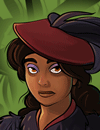The Agendums of Ascent: Difference between revisions
mNo edit summary Tag: visualeditor-wikitext |
mNo edit summary Tag: visualeditor-wikitext |
||
| Line 20: | Line 20: | ||
The '''Summer Collection''' is lit by concealed flames that use an array of prisms and lenses to bath the room in golden light.<ref>{{Citation|https://fallenlondon.wiki/wiki/The_Calendar_Code|The Calendar Code|Fallen London|}} ''"The Summer Collection [...] The room of Summer is bathed in golden light. An intricate array of prisms and lenses refracts and diffuses the light of concealed flames."''</ref> It contains the archives of [[June]],<ref>{{Citation|https://fallenlondon.wiki/wiki/The_Calendar_Code|The Calendar Code|Fallen London|}} ''"Peruse a manual of pleasure [...] Despite its eyebrow-raising title, this little volume is concerned with simple amusements. [...] this is a straightforward collection of ideas for frivolous amusements to fill idle afternoons. Yet you can detect an undercurrent of desperation in its party plans; a sense that without an itinerary for every occasion, the author could descend into dangerous introspection."''</ref> [[July]],<ref>{{Citation|https://fallenlondon.wiki/wiki/The_Calendar_Code|The Calendar Code|Fallen London|}} ''"A gap on the shelves [...] Surface insurgency [...] The library's filing system could be described as either revolutionary or anarchic. This section concerns radical movements in European cities: [...] you find an old bookmark of smudged yellow paper. [...] You've gained 1 x Carnival Ticket."''</ref><ref>{{Citation|https://fallenlondon.wiki/wiki/The_Calendar_Code|The Calendar Code|Fallen London|}} ''"Read an account of an uprising [...] One book stands out from a crowded section about radical movements in Europe. [...] The style is vivid, sweeping; wrought with flourishes of delirium. [...] This has not happened yet. Or this is fiction. Yet you remember the cries and the taste of iron."''</ref> and [[August]].<ref>{{Citation|https://fallenlondon.wiki/wiki/The_Calendar_Code|The Calendar Code|Fallen London|}} ''"A volume of polemic [...] This dense text contains many pages of fierce argument [...] A closer reading reveals a position which shifts and transforms from page to page."''</ref> When the room's lights are snuffed out,<ref>{{Citation|https://fallenlondon.wiki/wiki/The_Calendar_Code|The Calendar Code|Fallen London|}} ''"Close the shutter [...] The window is rigged with a similar apparatus to the room of Spring."''</ref> it is described as "sweltering in darkness" and "alive with the memory of a faraway sun."<ref>{{Citation|https://fallenlondon.wiki/wiki/The_Calendar_Code|The Calendar Code|Fallen London|}} ''"The room of Summer swelters in darkness. It is alive with the memory of a faraway sun."''</ref> Darkening the room also reveals a huge schematic on the ceiling, drawn in a glowing orange color that may be [[cosmogone]], the color of remembered suns.<ref>{{Citation|https://sunlesssea.fandom.com/wiki/A_Page_from_%27The_Neathbow%27:_Cosmogone|Items description|Sunless Sea|}} ''"C lights COSMOGONE, the colour of remembered suns."''</ref> The diagram's enormous scale and complex system of wheels imply that it is a blueprint for the [[Dawn Machine]].<ref>{{Citation|https://fallenlondon.wiki/wiki/The_Calendar_Code|The Calendar Code|Fallen London|}} ''"The entire ceiling is a schematic, traced in orange phosphorescence. [...] Wheels of fire [...] precise diagrams of clockwork, [...] Beyond the main wheels, the cogs are so delicate, and the lines so thin, that it is difficult to even perceive its full extent without climbing on the shelves to see more closely. Whatever this device may be, its workings are incredibly complex. And if that scale marker is correct, it is also immense."''</ref> | The '''Summer Collection''' is lit by concealed flames that use an array of prisms and lenses to bath the room in golden light.<ref>{{Citation|https://fallenlondon.wiki/wiki/The_Calendar_Code|The Calendar Code|Fallen London|}} ''"The Summer Collection [...] The room of Summer is bathed in golden light. An intricate array of prisms and lenses refracts and diffuses the light of concealed flames."''</ref> It contains the archives of [[June]],<ref>{{Citation|https://fallenlondon.wiki/wiki/The_Calendar_Code|The Calendar Code|Fallen London|}} ''"Peruse a manual of pleasure [...] Despite its eyebrow-raising title, this little volume is concerned with simple amusements. [...] this is a straightforward collection of ideas for frivolous amusements to fill idle afternoons. Yet you can detect an undercurrent of desperation in its party plans; a sense that without an itinerary for every occasion, the author could descend into dangerous introspection."''</ref> [[July]],<ref>{{Citation|https://fallenlondon.wiki/wiki/The_Calendar_Code|The Calendar Code|Fallen London|}} ''"A gap on the shelves [...] Surface insurgency [...] The library's filing system could be described as either revolutionary or anarchic. This section concerns radical movements in European cities: [...] you find an old bookmark of smudged yellow paper. [...] You've gained 1 x Carnival Ticket."''</ref><ref>{{Citation|https://fallenlondon.wiki/wiki/The_Calendar_Code|The Calendar Code|Fallen London|}} ''"Read an account of an uprising [...] One book stands out from a crowded section about radical movements in Europe. [...] The style is vivid, sweeping; wrought with flourishes of delirium. [...] This has not happened yet. Or this is fiction. Yet you remember the cries and the taste of iron."''</ref> and [[August]].<ref>{{Citation|https://fallenlondon.wiki/wiki/The_Calendar_Code|The Calendar Code|Fallen London|}} ''"A volume of polemic [...] This dense text contains many pages of fierce argument [...] A closer reading reveals a position which shifts and transforms from page to page."''</ref> When the room's lights are snuffed out,<ref>{{Citation|https://fallenlondon.wiki/wiki/The_Calendar_Code|The Calendar Code|Fallen London|}} ''"Close the shutter [...] The window is rigged with a similar apparatus to the room of Spring."''</ref> it is described as "sweltering in darkness" and "alive with the memory of a faraway sun."<ref>{{Citation|https://fallenlondon.wiki/wiki/The_Calendar_Code|The Calendar Code|Fallen London|}} ''"The room of Summer swelters in darkness. It is alive with the memory of a faraway sun."''</ref> Darkening the room also reveals a huge schematic on the ceiling, drawn in a glowing orange color that may be [[cosmogone]], the color of remembered suns.<ref>{{Citation|https://sunlesssea.fandom.com/wiki/A_Page_from_%27The_Neathbow%27:_Cosmogone|Items description|Sunless Sea|}} ''"C lights COSMOGONE, the colour of remembered suns."''</ref> The diagram's enormous scale and complex system of wheels imply that it is a blueprint for the [[Dawn Machine]].<ref>{{Citation|https://fallenlondon.wiki/wiki/The_Calendar_Code|The Calendar Code|Fallen London|}} ''"The entire ceiling is a schematic, traced in orange phosphorescence. [...] Wheels of fire [...] precise diagrams of clockwork, [...] Beyond the main wheels, the cogs are so delicate, and the lines so thin, that it is difficult to even perceive its full extent without climbing on the shelves to see more closely. Whatever this device may be, its workings are incredibly complex. And if that scale marker is correct, it is also immense."''</ref> | ||
[[File:September.png|alt=A man with long red hair and beard.|thumb|[[September]]]] | [[File:September.png|alt=A man with long red hair and beard.|thumb|[[September]]]] | ||
The '''Autumn Collection''' is a cozy space decorated in earthy and autumnal tones.<ref>{{Citation|https://fallenlondon.wiki/wiki/The_Calendar_Code|The Calendar Code|Fallen London|}} ''"The Autumn Collection [...] The room of Autumn is a restful and airy space, with comfortable chairs of tawny leather and low mahogany tables. Books lie open, their leaves mottled in rust and chestnut shades."''</ref> It contains the archives of [[September]],<ref>{{Citation|https://fallenlondon.wiki/wiki/The_Calendar_Code|The Calendar Code|Fallen London|}} ''"Decrypt a book of ciphers [...] You recognise from the lexical quirks that somebody is quoting Mr Pages. [...] What follows is an exhaustive deconstruction of each sentence, highlighting where it diverges from correct syntax and performing cryptographic analysis on each unnecessary superlative."''</ref> [[October]],<ref>{{Citation|https://fallenlondon.wiki/wiki/The_Calendar_Code|The Calendar Code|Fallen London|}} ''"Brave a book of nightmares [...] These appear to be genuine nightmares, confessed to physicians and priests. Each is followed by a discussion about how it can be exploited to manipulate political thought. [...] The thinking is creative and callous."''</ref> and [[November]].<ref>{{Citation|https://fallenlondon.wiki/wiki/The_Calendar_Code|The Calendar Code|Fallen London|}} ''"Examine a book of blank pages [...] An empty book in a library is in itself a potent symbol. The stories to be written on these pages depend on the actions of today."''</ref> The room's darkening mechanism requires two switches to be pressed at once, and when triggered,<ref>{{Citation|https://fallenlondon.wiki/wiki/The_Calendar_Code|The Calendar Code|Fallen London|}} ''"Clues from your reading suggest two switches here, set into the skirting board. They must be pressed simultaneously. [...] The mechanism chatters and the lights are slowly snuffed out."''</ref> the room is described as "retreating into darkness" and "alive with stories of tomorrow."<ref>{{Citation|https://fallenlondon.wiki/wiki/The_Calendar_Code|The Calendar Code|Fallen London|}} ''"The room of Autumn has retreated into darkness. It is alive with stories of tomorrow."''</ref> Darkening the room reveals an intricate star map on the ceiling, like a cloudless | The '''Autumn Collection''' is a cozy space decorated in earthy and autumnal tones.<ref>{{Citation|https://fallenlondon.wiki/wiki/The_Calendar_Code|The Calendar Code|Fallen London|}} ''"The Autumn Collection [...] The room of Autumn is a restful and airy space, with comfortable chairs of tawny leather and low mahogany tables. Books lie open, their leaves mottled in rust and chestnut shades."''</ref> It contains the archives of [[September]],<ref>{{Citation|https://fallenlondon.wiki/wiki/The_Calendar_Code|The Calendar Code|Fallen London|}} ''"Decrypt a book of ciphers [...] You recognise from the lexical quirks that somebody is quoting Mr Pages. [...] What follows is an exhaustive deconstruction of each sentence, highlighting where it diverges from correct syntax and performing cryptographic analysis on each unnecessary superlative."''</ref> [[October]],<ref>{{Citation|https://fallenlondon.wiki/wiki/The_Calendar_Code|The Calendar Code|Fallen London|}} ''"Brave a book of nightmares [...] These appear to be genuine nightmares, confessed to physicians and priests. Each is followed by a discussion about how it can be exploited to manipulate political thought. [...] The thinking is creative and callous."''</ref> and [[November]].<ref>{{Citation|https://fallenlondon.wiki/wiki/The_Calendar_Code|The Calendar Code|Fallen London|}} ''"Examine a book of blank pages [...] An empty book in a library is in itself a potent symbol. The stories to be written on these pages depend on the actions of today."''</ref> The room's darkening mechanism requires two switches to be pressed at once, and when triggered,<ref>{{Citation|https://fallenlondon.wiki/wiki/The_Calendar_Code|The Calendar Code|Fallen London|}} ''"Clues from your reading suggest two switches here, set into the skirting board. They must be pressed simultaneously. [...] The mechanism chatters and the lights are slowly snuffed out."''</ref> the room is described as "retreating into darkness" and "alive with stories of tomorrow."<ref>{{Citation|https://fallenlondon.wiki/wiki/The_Calendar_Code|The Calendar Code|Fallen London|}} ''"The room of Autumn has retreated into darkness. It is alive with stories of tomorrow."''</ref> Darkening the room reveals an intricate star map on the ceiling, like a cloudless night on the [[Surface]] before dawn.<ref>{{Citation|https://fallenlondon.wiki/wiki/The_Calendar_Code|The Calendar Code|Fallen London|}} ''"A star map [...] the cold scintillations paint a familiar skyscape. [...] you could be back on the Surface, staring up into a cloudless sky; awaiting the first touch of dawn."''</ref> | ||
The '''Special Collection''' is a hidden room whose entrance is only visible when the Winter Collection's chamber is darkened.<ref>{{Citation|https://fallenlondon.wiki/wiki/The_Calendar_Code|The Calendar Code|Fallen London|}} ''"Trigger a final darkness [...] The mechanism turns; the light dies; and there it is. A vertical line of luminescence bisects a bookcase on the interior wall. As the line widens, the books and shelves part to reveal a narrow entrance to a chamber lined with cases."''</ref> Lined with black velvet, this space contains a treasure trove of rare and ancient books,<ref>{{Citation|https://fallenlondon.wiki/wiki/The_Calendar_Code|The Calendar Code|Fallen London|}} ''"The Special Collection [...] Jet-black velvet lines the walls; rare books are arranged like tomb treasures. Your eyes play across volumes of celestial mysteries, secret rituals, hand-drawn atlases. But there it is, the papyrus you are looking for: elegant glyphs painstakingly inscribed with ink thousands of years old."''</ref> including a papyrus from the [[Second City]] written by an admirer<ref>{{Citation|https://fallenlondon.wiki/wiki/The_Calendar_Code|The Calendar Code|Fallen London|}} ''""He refers to her with these symbols: the sun-disk, above a cutting tool embedded in a wood block. And here: the youngest of six daughters. [...] he cannot hide the awe with which he regards her. It [...] I would say... a girl of noble birth." [...] He wipes his brow and offers you the papyrus."''</ref><ref>{{Citation|https://fallenlondon.wiki/wiki/The_Calendar_Code|The Calendar Code|Fallen London|}} ''"He frowns, and sits perusing it for a few minutes, his finger passing from column to column. "She kills her betrothed. She kills him with a snake. To be with her lover, the scribe." [...] "The scribe knows it can never be. He knows they will find out, and they will come for him. He writes that he is already dead. And the betrothed doesn't even die. He becomes [...]"''</ref> of the [[Duchess]].<ref>{{Citation|https://fallenlondon.wiki/wiki/My_Kingdom_for_a_Pig|My Kingdom for a Pig|Fallen London|}} ''"You had to do it, didn't you? But now you have a choice. High on the palace balcony, above the purple riverbank, they wait until the glyphs have dried – a disc; a tool embedded in a block – to collect the contract."''</ref><ref>{{Citation|https://fallenlondon.wiki/wiki/The_Calendar_Code|The Calendar Code|Fallen London|}} ''"'I write with words from the heart: if such a choice arises for you, reject the torment. Walk away. But I expect you will not.' [...] There is no signature. Just two simple symbols, scribed in careful strokes: a disk, above a tool embedded in a wood block. [...] You delivered the stolen papyrus to a dubious mog"''</ref> | The '''Special Collection''' is a hidden room whose entrance is only visible when the Winter Collection's chamber is darkened.<ref>{{Citation|https://fallenlondon.wiki/wiki/The_Calendar_Code|The Calendar Code|Fallen London|}} ''"Trigger a final darkness [...] The mechanism turns; the light dies; and there it is. A vertical line of luminescence bisects a bookcase on the interior wall. As the line widens, the books and shelves part to reveal a narrow entrance to a chamber lined with cases."''</ref> Lined with black velvet, this space contains a treasure trove of rare and ancient books,<ref>{{Citation|https://fallenlondon.wiki/wiki/The_Calendar_Code|The Calendar Code|Fallen London|}} ''"The Special Collection [...] Jet-black velvet lines the walls; rare books are arranged like tomb treasures. Your eyes play across volumes of celestial mysteries, secret rituals, hand-drawn atlases. But there it is, the papyrus you are looking for: elegant glyphs painstakingly inscribed with ink thousands of years old."''</ref> including a papyrus from the [[Second City]] written by an admirer<ref>{{Citation|https://fallenlondon.wiki/wiki/The_Calendar_Code|The Calendar Code|Fallen London|}} ''""He refers to her with these symbols: the sun-disk, above a cutting tool embedded in a wood block. And here: the youngest of six daughters. [...] he cannot hide the awe with which he regards her. It [...] I would say... a girl of noble birth." [...] He wipes his brow and offers you the papyrus."''</ref><ref>{{Citation|https://fallenlondon.wiki/wiki/The_Calendar_Code|The Calendar Code|Fallen London|}} ''"He frowns, and sits perusing it for a few minutes, his finger passing from column to column. "She kills her betrothed. She kills him with a snake. To be with her lover, the scribe." [...] "The scribe knows it can never be. He knows they will find out, and they will come for him. He writes that he is already dead. And the betrothed doesn't even die. He becomes [...]"''</ref> of the [[Duchess]].<ref>{{Citation|https://fallenlondon.wiki/wiki/My_Kingdom_for_a_Pig|My Kingdom for a Pig|Fallen London|}} ''"You had to do it, didn't you? But now you have a choice. High on the palace balcony, above the purple riverbank, they wait until the glyphs have dried – a disc; a tool embedded in a block – to collect the contract."''</ref><ref>{{Citation|https://fallenlondon.wiki/wiki/The_Calendar_Code|The Calendar Code|Fallen London|}} ''"'I write with words from the heart: if such a choice arises for you, reject the torment. Walk away. But I expect you will not.' [...] There is no signature. Just two simple symbols, scribed in careful strokes: a disk, above a tool embedded in a wood block. [...] You delivered the stolen papyrus to a dubious mog"''</ref> | ||
Revision as of 22:17, 14 December 2024

|
Beyond this point lie major spoilers for Fallen London, Sunless Sea, Sunless Skies, or Mask of the Rose. This may include endgame or major Fate-locked spoilers. Proceed at your own risk. You can find out more about our spoiler policy here. |
"That's not just any library you're talking about. It's something special. Put together by upmarket anarchist types. Twelve of them in total. Not that they go there much. But between you and me, I reckon they're up to something big."[1]
The Agendums of Ascent is a library owned by the Calendar Council.
Le Quattro Stagioni
"I remember when they bought the building. Strange birds. Genial chap from the University; woman with singed eyebrows. They wanted me to devise a filing system for their books and papers, which I did. Elegant use of facets, I thought. Then yet another of their group scrapped the whole thing. He replaced it with some system based around seasons – and to top that all off, it plunges the whole mess into darkness. I hope he stubs his toe flailing around in there."[1]

The Agendums of Ascent is owned by the Calendar Council,[2] and newspapers from the area suggest that it is a staging ground for experiments involving the Liberation of Night.[3] The building was originally purchased by April and a "genial chap" from the University,[4] and they contracted an academic to design its filing system. However, another member of the Council overruled this plan, and indexed the collection by season instead.[5] The Agendums' four main chambers each correspond to a season; they all contain a mechanism to shutter the room's lights and windows and plunge it into pitch blackness,[5] as well as a one-way door[6][7] so that visitors may explore the seasons cyclically.[8][9]
The Collections
"The room of Spring is decorated in a palette of greens, from the olive upholstery to the pine and mossy shades of the carpet and ceiling. The scheme may not please a Veilgarden decorator, but it vividly evokes Surface days."[1]
"The switch is concealed in a recess behind a shelf. When you depress it, the switch withdraws into the wall. A whirring arrangement of clockwork tilts the window slats, slowly narrowing the strips of light between them. At the same time, the interior lamps are snuffed, so the room plunges into darkness. There is no obvious way to reverse the process."[1]

The Winter Collection is painted in a frosty-white color that captures and softens all surrounding light.[10] It contains the archives of December,[11] January,[12] and February.[13] When the room is darkened,[14] it is described as "shrouded" and "alive with the potential of the frozen void."[15]
The Spring Collection is painted and decorated in leafy and mossy shades of green.[16] It contains the archives of March,[17] April,[18] and May.[19] When the room's lights are shuttered,[20] darkness "thrives" here, and the room is "alive with promise and menace."[21] Darkening the chamber also reveals a glowing map of London on the ceiling. The city's districts are highlighted in purple, some more intensely than others; according to the map's key, purple denotes "LIBERATION."[22]

The Summer Collection is lit by concealed flames that use an array of prisms and lenses to bath the room in golden light.[23] It contains the archives of June,[24] July,[25][26] and August.[27] When the room's lights are snuffed out,[28] it is described as "sweltering in darkness" and "alive with the memory of a faraway sun."[29] Darkening the room also reveals a huge schematic on the ceiling, drawn in a glowing orange color that may be cosmogone, the color of remembered suns.[30] The diagram's enormous scale and complex system of wheels imply that it is a blueprint for the Dawn Machine.[31]

The Autumn Collection is a cozy space decorated in earthy and autumnal tones.[32] It contains the archives of September,[33] October,[34] and November.[35] The room's darkening mechanism requires two switches to be pressed at once, and when triggered,[36] the room is described as "retreating into darkness" and "alive with stories of tomorrow."[37] Darkening the room reveals an intricate star map on the ceiling, like a cloudless night on the Surface before dawn.[38]
The Special Collection is a hidden room whose entrance is only visible when the Winter Collection's chamber is darkened.[39] Lined with black velvet, this space contains a treasure trove of rare and ancient books,[40] including a papyrus from the Second City written by an admirer[41][42] of the Duchess.[43][44]
References
|